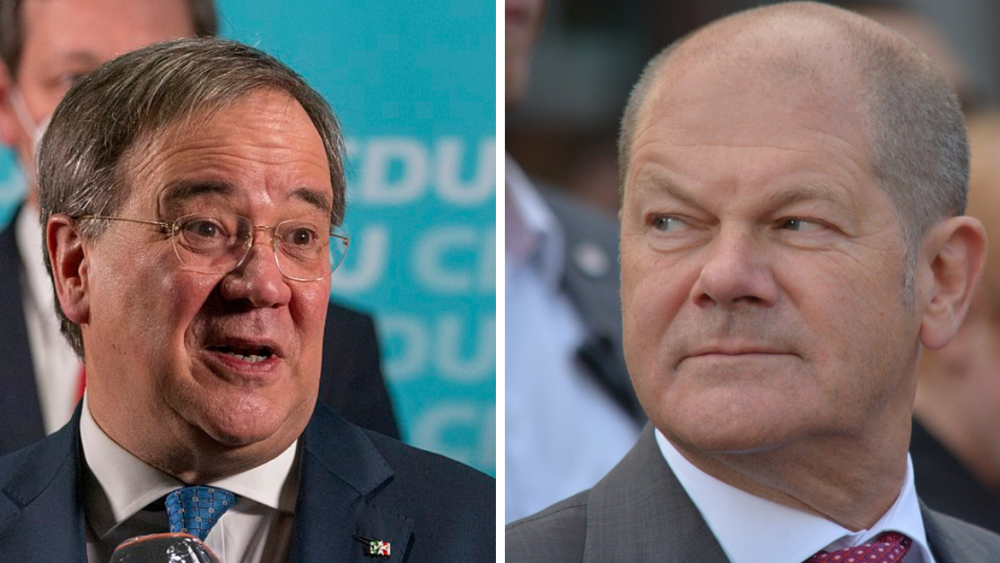It’s now down to Olaf Scholz vs. Armin Laschet. Who will be the next chancellor in Germany? In most polls, Scholz’s party, the Social Democratic Party (SPD), has a slight lead over Armin Laschet’s conservative CDU. But with only a few days to go, one poll showed that 40 percent of voters are still undecided. The race is open.
The real drama will begin after the election. To form a majority in parliament, both parties would need to form a coalition – which might take months. A three party coalition with the Greens and the neoliberal FDP is the most likely outcome, led by whomever wins the election.
If the Left Party will re-enter parliament (they’re currently polling six percent, while the threshold is five), a coalition of Olaf Scholz’s SPD, the Greens and the Left Party (called Red-Red-Green, or R2G) might also be possible, at least on paper. Both Scholz and Annalena Baerbock, the candidate of the Greens, have not ruled out such a coalition. But they demand a commitment to NATO from the Left party, which the Left party does not want to give. So while R2G might be an option, it’s more likely that Scholz will use the possibility of R2G as leverage in coalition talks with the FDP.
Whatever the outcome, the big question for DiEMers is: Will the election bring change for Europe? With 16 years of Angela Merkel coming to an end, will Laschet or Scholz be any different? Will one of them finally stop holding Europe hostage by blocking any meaningful reform?
The short answer is: No, probably not.
Why? Because they will have no mandate for any reform. Europe is non-existent in their election campaigns. They are no eurosceptics, either. Both candidates are labeling themselves as pro-European – Laschet sees himself in the tradition of Helmut Kohl, while Scholz is praising himself for the Recovery Fund. But none of them are campaigning on European issues. Laschet’s CDU has already ruled out a fiscal union and promised a quick return to European deficit rules, while Scholz is simply campaigning on the claim: “Chancellor for Germany”
Even if one of them were to tackle progressive European reform – a real Green New Deal, proper Eurobonds or even a European constitution – he would have a powerful coalition of the FDP, convervative newspapers like Bild, FAZ and Welt and the German industry against him. We cannot expect much help from the Green Party, either. They’ll accept anything as long as they can govern and can have a few green projects. That, at least, will require suspending or bypassing the debt break for green investments, setting a precedent for other European countries to do the same.
What will happen when the unexpected happens?
So we should not expect much. Both Laschet and Scholz are conservatives. Like Merkel, they are Europe’s false friends. They wear a pretty European dress, but their politics directly lead to the disintegration of the EU. And they have neither interest nor a mandate to change German politics one bit.
So the more interesting question for DiEMers might be: What will happen when the unexpected happens? How will Laschet or Scholz react to the next crisis? A crisis that surely will come, given the state of the EU. For as long as possible, we will see Merkel 2.0 – preserving the existing order, managing the madhouse. But what if one day the forces of disintegration become too severe to handle?
Then, it will no longer be about Laschet vs. Scholz. It will be people vs money.
In this fight, one scenario is that the people of Europe rise up and use the fall of the European Union to get rid of the old and begin something new: A European Spring, based on real democracy and shared prosperity. That’s the dream…
But right now, the more likely scenario is rather a nightmare. A too big to handle disintegration of the EU would open up room for what Naomi Klein describes as shock therapy: More depoliticised, technocratic governments, rushed trade treaties, leaving markets open but parliaments closed. During the Euro crisis, German politicians and their allies demonstrated that they don’t care much about democracy when push comes to shove. Neither Laschet nor Scholz will be any different.
Signing a petition is not enough
So what can we do, as DiEMers, in Germany and Europe? In a nutshell it is this: Radically challenging the existing order and aiming for power and democracy.
In practice, this must mean two things. First, our activism has to become more radical. We cannot challenge power by signing a petition. It also needs to become more targeted, for only then it becomes a threat to the existing order. #MakeAmazonPay was a first step in this direction. For some people, the thought of more radical, more targeted activism might be uncomfortable – it is for me, anyway. But what is the alternative? Obedience until the end?
Second, our activism has to aim for power and democracy. Either by winning power in elections, or by reclaiming and occupying spaces, neighbourhoods and cities, powered by a new, open, participatory democracy. Or a combination of both. The upcoming launch of the DiEM25’s electoral wing in Germany and the DiEM25’s Peoples Gatherings are a step in this direction.
For both, it needs your initiative and courage. Don’t wait for the outcome of the German election, it won’t change the doomed curse of the EU. Change only happens when people like you rise up because they are fed up with injustice across the world.
Do you want to be informed of DiEM25's actions? Sign up here















